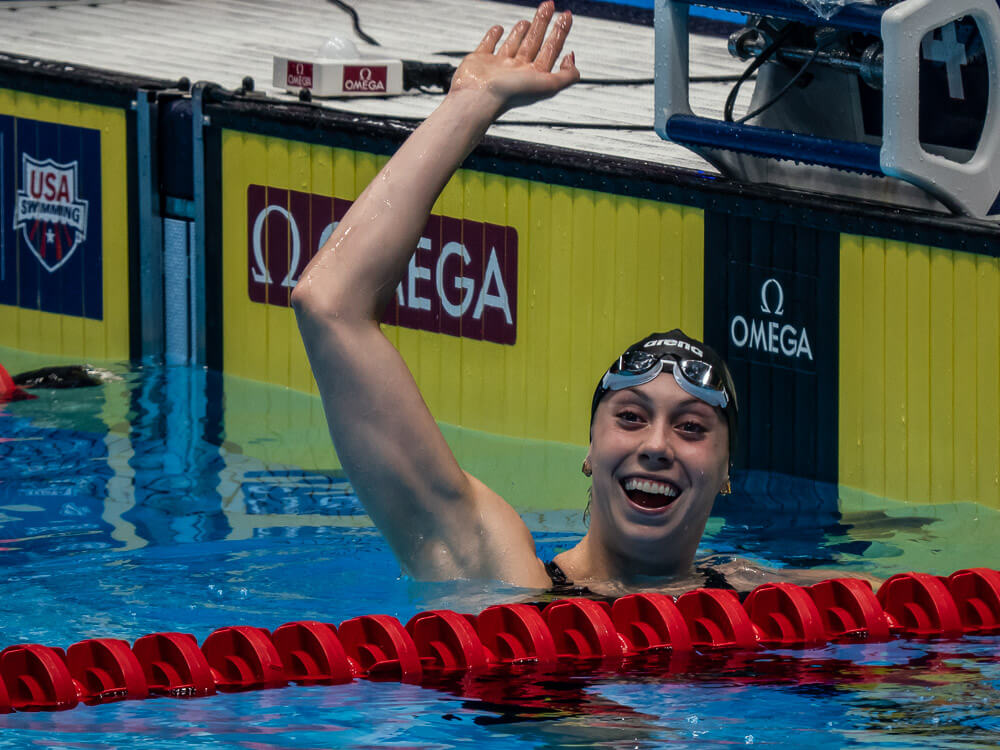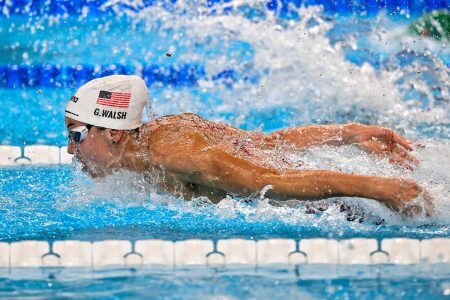A Special Week: Gretchen Walsh Achieves Greatest Short Course Performance Ever

A Special Week: Gretchen Walsh Achieves Greatest Short Course Performance Ever
Surprised by the sheer dominance that Gretchen Walsh imposed on the world’s best sprinters at the Short Course World Championships? Then you haven’t been paying close enough attention to the 21-year-old’s trajectory over the past three years since she arrived at the University of Virginia.
Walsh was destined for greatness in Budapest — but to this extent, this flair for record-breaking fireworks? Seven gold medals could have been foreseen, perhaps more if Walsh competed in backstroke or on additional relays.
But nine individual world records in six days? Simply, that has never been done in swimming history.
The summer of 2024 was Walsh’s long-course breakout, Walsh breaking Sarah Sjostrom’s world record in the 100-meter butterfly before winning five Olympic medals in Paris. But she had dominated the college ranks long before that. Walsh has developed underwater dolphin kicks superior to any other female swimmer in the world, and short course racing allows that skill to mask any stroke flaws.
Fading in a long course 100 free? Not in short course, with half the race contested underwater. Backstroke? Walsh did not bother contesting it at the U.S. Olympic Trials, knowing her tickets to Paris would come in free and fly, but she is the fastest swimmer ever in short course yards. Her historic junior season at Virginia made Walsh the fastest swimmer ever in four short course yards events by enormous margins, including by more than a second in the 100-yard fly.
A lone college dual meet held in short-course meters in mid-October saw Walsh break three American records before taking the world record in the 100 individual medley. That was sufficient evidence that Walsh would bring her NCAA preeminence to the global level, with the differences between the 25-yard and 25-meters courses minimal. One or two extra stroke cycles would not induce the drop-off that Walsh is still working to overcome in long course.
We must acknowledge that many short-course world records do not measure up to their long course counterparts, with many elite swimmers frequently skipping the biennial Short Course World Championships. Sjostrom, for instance, has won medals at eight long-course World Championships over a decade and a half, but only at two editions of the 25-meter meet.
Many of the records Walsh broke in Budapest were long-lasting and overdue for crushing: Ranomi Kromowidjojo had set the 50 free world record in 2017. Therese Alshammar last set the 50 fly mark all the way back in 2009. The 100 IM mark, which Walsh first broke in October before lowering it twice this week, also dated to 2009.

Gretchen Walsh — Photo Courtesy: Giorgio Scala / Deepbluemedia / Insidefoto
On the other hand, the 100 fly record at the start of the meet was 54.05, considered groundbreaking when Maggie Mac Neil dropped a half-second off the previous standard at the last Short-Course Worlds in Melbourne. Walsh made that time look silly as she got down to a previously-unthinkable time of 52.71.
This performance stacks up among the greatest in swimming history, although it would be short-sighted to rank Walsh ahead of some of the all-time long-course efforts at World Championships, like Katie Ledecky sweeping the 200, 400, 800 and 1500 free in 2015. Accomplishments in the 50-meter pool will continue to be valued above anything in short-course, barring any surprise changes to the Olympic format.
But the greatest short course performance ever? Yes. The greatest year of short course swimming ever, combining her collegiate results with this global gold rush? Indeed, and the only legitimate comparison would be all the way back in 2006.
That year, Ryan Lochte dominated his senior season at the University of Florida and then traveled to Shanghai for the Short Course World Championships. He won three individual events and swam the fastest times ever in three events (including one relay leadoff) at the NCAA Championships before matching that accomplishment in short-course meters on the global level.
Good company for Walsh to be keeping, with Lochte widely regarded as one of the top-10 performers in the sport’s history. But there are no other comparisons: in 2018, Caeleb Dressel swam the fastest time ever in five different yards events as a senior with the Gators, but he did not match those results at Worlds, with a lone individual gold and no world records. On the women’s side, there is nothing close to matching up, the closest recent resemblance belonging to long course efforts from the likes of Ledecky, Sjostrom, Missy Franklin and Katinka Hosszu.
Walsh will return to college swimming with designs on dominating another NCAA Championships and leading Virginia to an expected fifth consecutive national title. Then comes the more daunting challenge, trying to achieve a sliver of the same success in long course at the World Championships in Singapore next July. Plenty of Walsh’s key rivals who skipped Budapest will be back in the hunt, including the American who edged Walsh for Olympic gold in the 100 fly, Torri Huske.
Walsh will probably never be as good in long course as she has become in short course, but that does not matter. Even Leon Marchand remains superior in the short pool, and he just captured four individual Olympic golds in Paris. Walsh might soon reach that gold-medal podium for her long course results after spending so much time there this week in Budapest.
But her short-course talent, shown off for years on the college circuit, has now produced a global phenomenon and a very convincing argument for best ever outside of the Olympic-distance course. Whatever Walsh achieves in any format over the remainder of her career, this illustrious week will forever be a highlight.





Love those Walsh sisters!!!